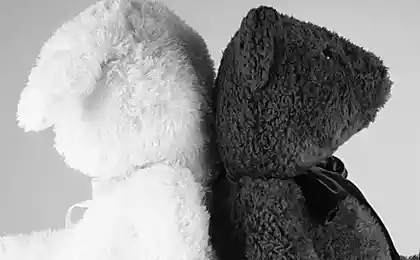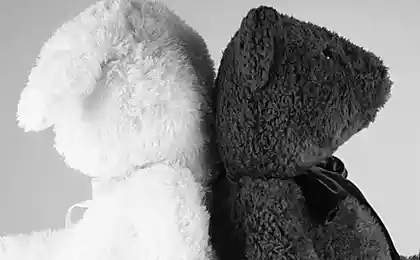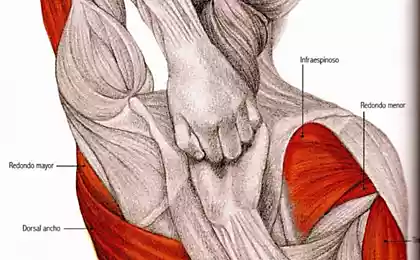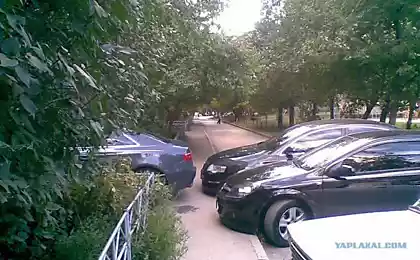578
How to deal with rudeness, without coming down to him?

How to deal with rudeness? At the bus stop, in a nearby store, office, aircraft, at a parent meeting, and even queue up for tickets to the theater - it seems rude to us everywhere. Rudeness has long been a feature of our society, as a chronic disease that can not be vylechit.Zhurnal Psychologies asked the experts how to protect themselves from the effects of the disease. < Website gladly publish them useful tips
According to sociologist Hope Kazarinova, rudeness -.. This kind of violence, invasion of foreign territory If in a society at the basic level there is no respect for the individual, there is a feeling that the boundaries of what is permitted in relation to another person simply does not exist.
"In Russia, this type of behavior has long been the norm, for which there are certain historical prerequisites, - says Elena Petrovskaya, a philosopher, an anthropologist. - First, we recently (in historical terms) serfdom was abolished. servant / master relationship formed quite stable "slave mentality": a mixture of disrespect (to themselves and others) and the envy of those who are stronger. Secondly, the first Russian village, with its communal system, and then the Soviet collectivism led to that formed a type of communication between the people in our country, in which an individual just does not stand out. What kind of respect is already here can we talk ... »
Rudeness has always been a feature of the lower strata of society is not in vain in the dictionary by Vladimir Dal" hamuga. "- The nickname waiter, servant or slave. "Ham - is the one who is doomed to be between the lord and a commoner - says Nadezhda Kazarinova. - Before the last it looks almost a gentleman, but a gentleman is not. Ham demonstrates the dangerous status of the individual, which can not be respected, but to fear - hence rudeness, ridicule, and other manifestations of aggression. He is the enemy, and those below him on the social ladder, and those who are above, and behaves
respectively. " Such widespread rudeness in modern Russian society bind sociologists including with tacit government policies aimed at impairment of the rights of a single individual. «< When rudeness is present at the highest level, on television, in the media, it may not affect the distribution of small, everyday rudeness, - explains social psychologist Catherine Dubovskaya. - Valid logic: if "they" all you can, why not me »
? With those or other manifestations of rudeness we face everywhere: on the way to work in the government offices, shops, theaters, and even in your own home. How to protect against rudeness, without coming down to him
Step 1: Understand the «The first reaction to rudeness can be emotional, but if abstragirueshsya becomes almost feel sorry for these cads - the same as a negative in need currently carry », - divided Andrei, 25 years
. To develop the optimum tactics of communication with a cad, it is necessary to begin to understand the reasons for his behavior. The motives may be different, but they are almost always talking about the lack of self-esteem, desire to assert himself or prove his power to others. "Ham compensates for the inherent weakness, gaining living space by the collision with the other", - explains Hope Kazarinova. Or check the boundaries of what is permitted. "So behave young children to parents:" So you can be? And this is "On first glance, this show of force, but it comes from self-doubt?" - Argues Catherine Dubovskaya. The rudeness is often "escape" from uncomfortable situations of communication - decline to clarify the relationship, the authorities claim or awkward moments
. What I understand cad rather than defend against him? The fact of the matter is that an understanding largely protects us - and helps not to take rudeness to heart: "It must be remembered that many cases are not rudeness to you personally. Then, in the first place, why be upset? And secondly, on the impersonal attack easier to answer ", - explains Catherine Dubovskaya
Step 2: dial distance « When faced with rudeness I always feel confused, do not know how to respond to rudeness, -. says Valery, 37 years old. - Understanding how to behave should have come much later »
. Similarly feels most people. Ostroumnaya replica comes to us when the ham had disappeared around the corner. It is a painful blow to self-esteem, but to answer the aggressor in that whatever the cost should not be an end in itself. "The fact that rudeness does not involve dialogue, it is destructive to the relationship. Rudeness shows a lack of contact between people - warns Catherine Dubovskaya. - Two people who are trying to resolve the conflict in this way, rolling on parallel paths »
Preventive medicine from someone else's rudeness -. Raising self-esteem and above all respect for himself effective. tactics - correct distance. Ham do not be afraid and even more to show him her fear. Keep in mind that its main purpose - to engage you in a dialogue, built by his rules. Ham and therefore feels unpunished, that his "victim" can not immediately violate these rules, "- says Hope Kazarinova. "The ability to build a framework that may not be violated, - an important characteristic of an adult," - says Catherine Dubovskaya
Step 3: Change stsenariyPrezhde than "teach" cad good behavior, think about what you want to get things. reaction. Show him how disgusting his behavior? This will enable you to cycle rudeness. It is unlikely that a stranger will say: "Thank you to pay attention to my faux pas. I do so I will not. " In this case, the main thing - clearly convey to cad idea that he has no right to behave in this way towards you. Of course, without the aggression and attacks.
Psychologist Anna Mstislavskaya proposes to consider the situation from the perspective of transactional analysis: "According to transactional analysis, each of us has 3 states," I "- Parent, Adult, Child with the parent position we routinely teach others. show, what is good and what is bad. But do not forget that parents not only criticizes (Parent critic), he also takes care of others (caring parents). The reaction to rudeness from a position of critic Parent will be: "What do you allow yourself? How can you treat me like this? ". This reaction does not lead to further constructive dialogue. Caring parent wants to help the other, trying to understand their needs. This is a more constructive approach. we can tell from the position of caring parents: "I see your dissatisfaction with my behavior / my act, I'm sorry," or use some manipulative phrase: "How can I help you?" So we show our strength and at the same time not stoop to rudeness. »
Adult in a collision with a cad rather evades direct conflict - keep silent or apologize (as appropriate), with no excuses. Being in adulthood, we are able to understand what motivates a person, why he was so rude to us.
From the children's condition (child) we will hardly be able to resist the boor: a desire to protect itself in that no matter what we will provoke aggression. This will only lead to an escalation of the conflict. Therefore, if we want to show the other person that we should not be rude, it is better to focus on the position of adults or caring parents. »
no power to keep silent? The manual" How to protect against rudeness. 7 Simple Rules "psychologist Vladinata Petrov describes the verbal self-defense techniques in communicating with Hammami. Here are some of them:
"All of a situation when you attack, similar to each other: the aggressor assumes the right to judge us and invade our lives. Any aggressor, no matter how high position he may hold, it is possible to put in place, pointing out to him the inconsistency of his real status and the role that he himself conferred: "On what basis are you asking me these questions?" "On what basis do you make me ekzamenuete? "; "If you say something is clearly uncomfortable, but you can hardly find words to express what you are hurt and what it is you do not agree, ask:" It's a question? "" It's a statement? "Or" This is an indication? " depending on what is more like a replica unpleasant content "; What if the unpleasant communication is delayed and the aggressor does not leave you alone? "In this case, set the Barker question with a verb in the passive voice, eg," What makes you say it to me "(" What made you say it (make) "?) This method - the method of a kind of" Put on the aggressor chief? ". So the question you show the attacker that he has become a toy of his own passions that govern "; "If you want to make a point to those who behaved disrespectfully to you, do not reproach enemy actions and qualities that can not be represented by a vision or hearing. If you say, "Do not raise your voice at me," it will be a comment on the merits. Or, for example: "Please do not talk about me in the third person, if I'm in the same room." If you say, "Stop talking rude" you ascribe companion action, visually presentable, abstract, about the real content of which is debatable. That your abuser is behaving "ugly" or "rude" - it's just your personal opinion. " Priority - otnosheniyaV general, all our experts agree on one thing: verbal aggression as a response to rudeness - this is an extreme and not the best way
. You have to understand that the conflict situation is always a bad understanding. In this case, you need time to step aside, to realize its causes. "If you is important to establish communication, it is necessary to show people that you understand it, moving from the Children (offended) positions in adults (sensible) - advises Anna Mstislavskaya. - You want to show your partner that behave this way is unacceptable to you? But ask yourself: do you really want him to change his behavior, or you just a shame that he was rude? If you are overwhelmed with emotions, tell that hurt rather than "run the machine" on the human response. »
Try to feel what is behind this rudeness, why people so close to you (suddenly) is rude. Probably, you will uncover the root causes of his behavior, which affect not just individual situation and relations in general. And then ask: «You probably know how I could correct a situation that you do not want to be rude to me. Tell me, what do you expect from me, "So we took a step towards open dialogue
Experts:?.
Hope Kazarinova, sociologist and author of the study "Rudeness and insults as a communicative practice».
Elena Petrovskaya, philosopher, chief editor of "Blue sofa».
Anna Mstislavskaya, counseling psychologist, a specialist in transactional analysis.
Catherine Dubovskaya, social psychologist.
via www.psychologies.ru/self-knowledge/communication/immunitet-ot-hamstva-kak-reagirovat-na-grubost/























